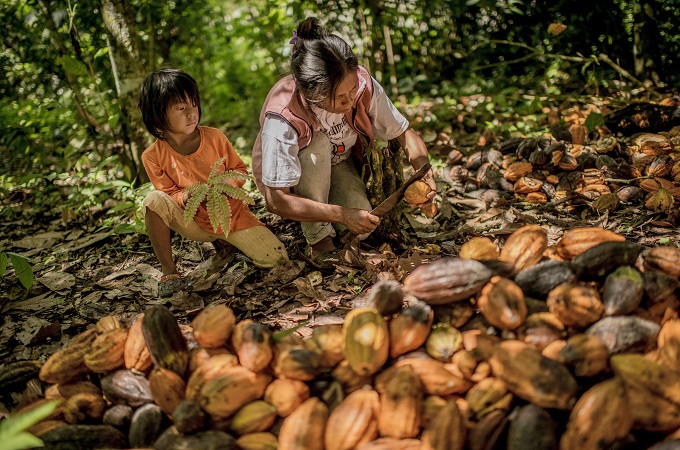The International Trade Centre works directly with the private sector providing capacity building and trade intelligence to exporters and trade support institutions. With many of our clients being exporters in the agricultural sector, we felt it important to understand their perspective of climate change and their strategies for increasing resilience. In that way we can respond more effectively to challenges that climate change is presenting to the export agriculture sector in developing countries. The result of this work is the publication in June 2015 of Climate Change and the Agri-Food Sector – Perceptions of exporters in Peru and Uganda.

Photo Credit: Uganda (ITC/Glenna Gordon) – Most coffee farmers in Kesese, Uganda are women
Climate change is reducing export competitiveness
The key finding from this survey carried out under ITC’s Trade and Environment Programme is that climate change is reducing the competitiveness of agricultural exports from Peru and Uganda. This is important in development terms because agricultural exports are a key source of income for Uganda and Peru, and a major driver of rural job creation and income growth. For instance, agriculture is the key economic activity in Uganda, employing 67% of the population and contributing 45% of export earnings.
In both Peru and Uganda, the majority of exporters surveyed reported that climate change was of equal or greater importance to longstanding challenges such as price volatility, high operating costs and meeting product quality requirements.”
The perceptions of the surveyed exporters about climate change match the science as reported by IPCC AR5.
For example, between a third and two thirds of the surveyed exporters observed changes in seasonality and variability in temperature and precipitation. Changing seasonality makes planning difficult as a fruit exporter from Kampala explains “It is hard to plan with the farmers. We encourage them to grow, but due to the shift in seasons, the produce becomes available when we don’t have the market anymore. This leads to a lot of frustration and problems.”
Climate change is making exports of key export commodities such as cocoa, coffee, cotton, tea and tobacco unpredictable. In addition to affecting harvests, climate change is causing post-production losses, for instance when floods cause food to rot before it can reach a processing plant or a port.
A fruit exporter in Lutembe, Uganda underlines the increased uncertainty now in his business “Climate change can be quite dramatic as our company depends on climate both for production and processing. It leads to insecurity. Even if the crop is good, there is uncertainty as to whether it can be processed at competitive cost”.
In Peru, a coffee export cooperative leader tells a similar story “The rust outbreak has already affected our livelihoods…climate change will definitely have a strong effect because of the harm it will do to crops”. In Cusco, a coffee exporter remarked that “Production will be lower until coffee plants adapt to new climates…which takes a long time.”
Exporters report that rising temperatures and more variable rainfall is damaging agricultural productivity while extreme weather events like floods damage roads and other supply chain infrastructure. A coffee exporter from Piura highlighted what this means for business competitiveness “When roads are interrupted, it delays the delivery process and it is not possible to meet orders on time. Carriers also raise their rates.”
Exporter needs to strengthen resilience
Micro, small and medium-sized enterprises (MSMEs) report that they are already providing locally-driven solutions for climate adaptation, such as agricultural extension services. However, this is not enough. They say that they require public support to implement such initiatives on a larger scale.
Agricultural exporters in both Peru and Uganda called on their governments to integrate climate change into long-term, sector-specific policies and investment strategies. Based on these findings, the ITC study recommends that the international community develop a climate platform to share information on best practices more effectively. Furthermore, targeted training in climate-smart agriculture as well as on meeting sustainability certification requirements would also help exporters respond to climate change.

Photo Credit: Peru (ITC/Tomas Munita) – Harvesting cocoa in Cusco Peru
According to the surveyed exporters, better access to financing would help them invest in sustainable practices and infrastructure improvements such as access to irrigation. Likewise, improved access to more reliable climate information would enable better responses to shifting weather patterns.
Better networks and partnerships are also needed. While exporter associations exist for certain commodities in both Peru and Uganda, expanding their membership and the services they provide could improve knowledge-sharing and create new opportunities to attract funding and government support for managing climate risks.
Agricultural exporters also identified crop diversification and the development of new crop varieties, such as drought resistant ones, as vital to sustaining export viability.
The findings also illustrate the contrasting capacities of countries to adapt to climate change given differing levels financial and technical resources. From ITC’s side, the study enables us to mainstream thinking on climate change more effectively into project design particularly for agricultural sector projects, as well as make a contribution to the Aid for Trade community on how to mainstream climate change into programming.

